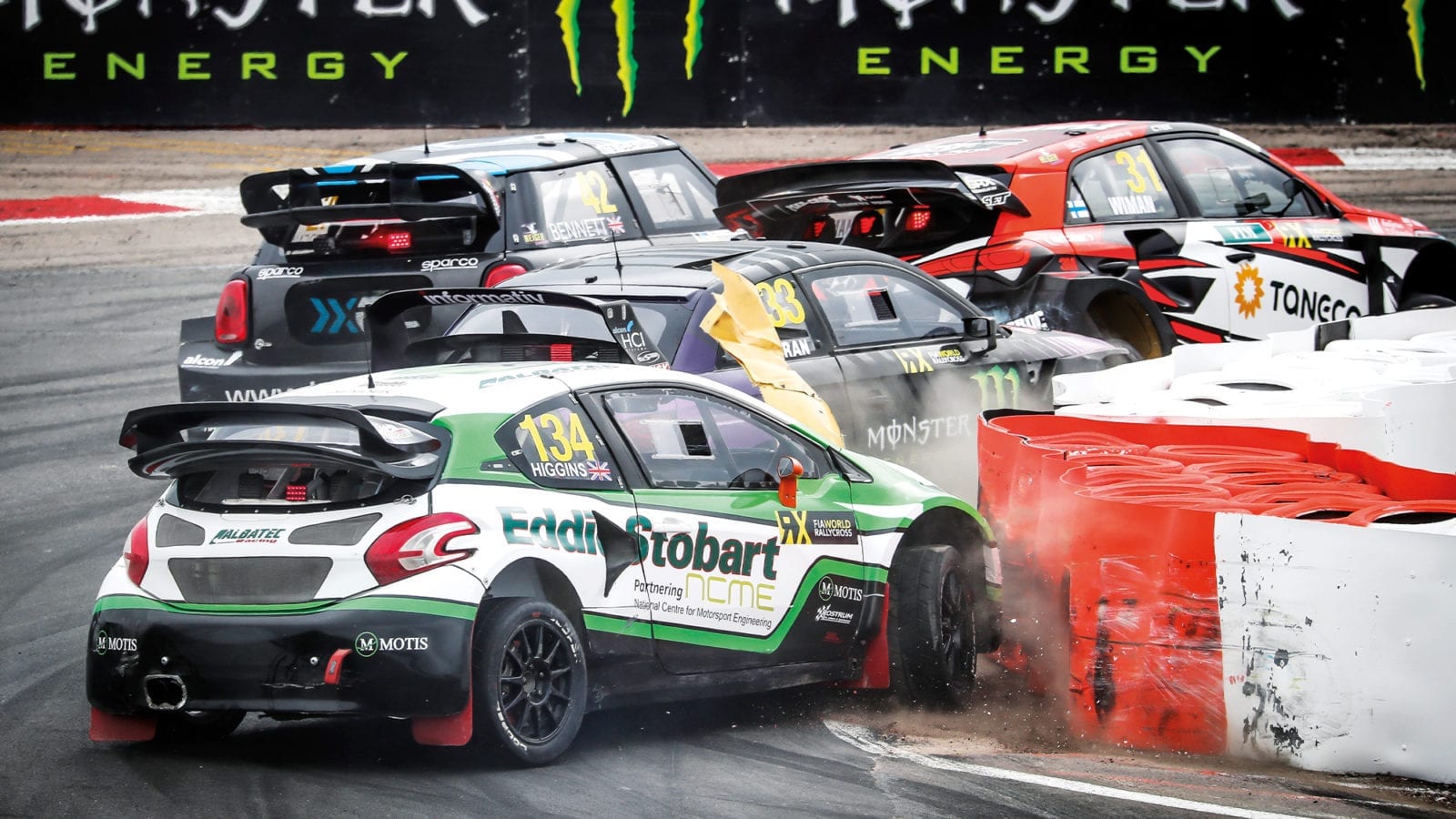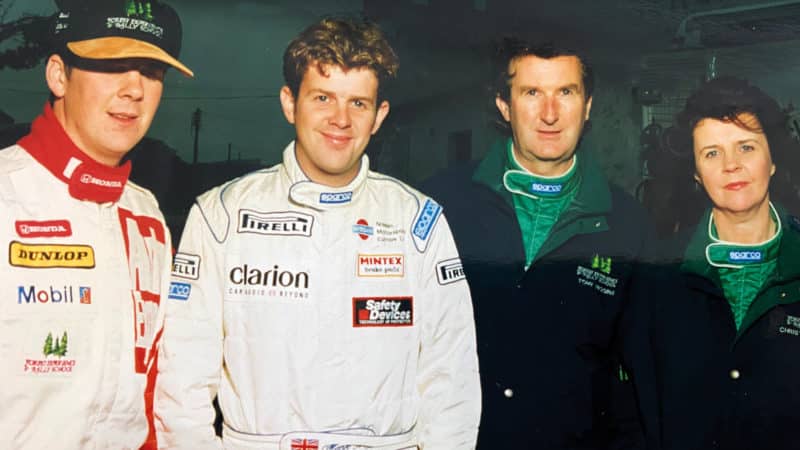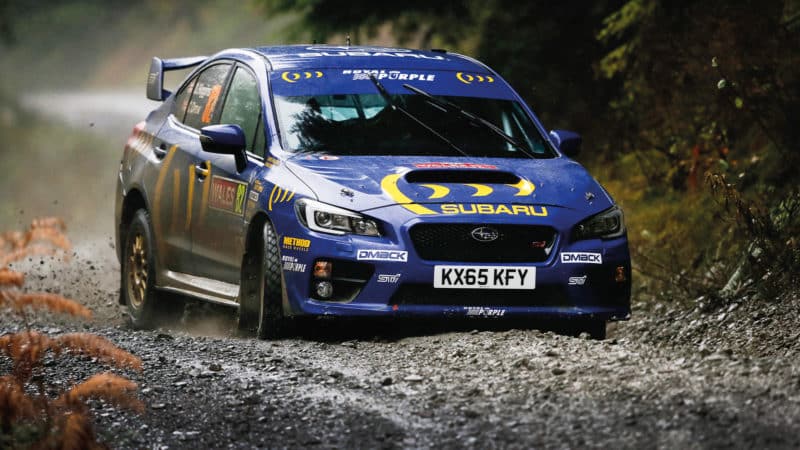Racing Lives: Mark and David Higgins
Rally driving runs in the family for Mark and David Higgins, who have built their careers on their driving skills

The Albatec Peugeot 208 RX of Mark Higgins
When your mother, father, grandma and grandfather are rally drivers, there’s a distinct possibility that a life behind the wheel awaits, And that’s what happened to brothers Mark and David Higgins, who recall that their fiercely competitive sibling rivalry often scuppered their finishing positions in early races.
Now aged 49 and 48 respectively, the Isle of Man-born pair have enjoyed varied careers. Mark is a leading Hollywood stunt driver, working for franchises such as James Bond, while David has had huge success rallying in America, with 10 championship titles to his name.
Mark Higgins
“The Isle of Man was a motor sport Mecca. You had the TT and the Manx Rally, which was such a big event at the time when we were growing up, and all our family rallied. My Nana and Grandad drove and co-drove together in Minis, my Mum was a driver, my Dad drove, and we’d always be at events, competing or helping out.
Yet it was stark contrast to today. We didn’t have big money and competitions were very much a hobby for the family. We only had one car, a Mini, so we’d do autotesting, autocross, night rallying and stage rallies and then drive
the car to work on a Monday morning.
I vividly remember sitting on a hedge with my brother next to me in a pram–so I would have been four-years old – watching the lights come down the road on the Manx on the night rallies with my mum, watching Grandad and Nana [Ken and Evelyn Leece] and then my Dad do the same rally, and my uncles did it as well. My other uncle and godfather was Gary Leece, who was a very competitive driver over there. It was everything to a young me.

Family business mid-’90s… David, Mark and racing parents Tony and Christina
Growing up, I used to sit on Dad’s knee and help drive the Mini. So when I was four at school and asked what I wanted to be, I told the teacher I’d either be a rally driver or a fighter pilot. I was never clever enough to be a fighter pilot but I was lucky enough to go down the rallying route.
When the Manx was in the Rothmans days, Mum would work at signing-on. For the two weeks building up to the rally, I’d want my Dad to take me down to the promenade every day so I could see what cars had arrived off the boat and would be parked up on trailers outside the hotels. You’d see MkI Ford Transits with a Chevette or Escort on the back, and up and down we’d go, looking at all these great cars – and the Irish boys coming over with their fake Mantas and Ascona 400s – and then switching on the telly to watch every minute of Grandstand on BBC.
All I wanted to do was get on the road. When it was one minute to midnight on the eve of my 16th birthday, I went out with my Mum and Dad because you could drive from 16 on the Isle of Man. Funnily enough, I did the same thing with my daughter when she was 16 two years ago.
I did my first stage rally with Mum as my co-driver in an Opel Manta. I was third- quickest, then I crashed on the next one! So I showed signs of brilliance but was excitable. Happily, I was spotted by Roy Dixon, a local businessman, and he went on
to sponsor and manage me; Roy’s in his eighties now and we’re still in touch. In those days, if I got past the second stage it was all going to be good, and as I got older I became a lot faster without taking the same levels of risk or employing brute force and bravery. I think I was trying to prove to people I could be the fastest driver to make a point.
David and I get on really well and the only awkward moments was when we were both competing in Group N. That’s when we’d find we’d be talking to the same people about drives, sponsorship opportunities and end up treading on one another’s toes. He’s quieter than me, doesn’t hide it when he doesn’t like someone, and is incredibly committed. He has fought hard to keep his rallying going.
However, I don’t think I ever got to where I ultimately wanted to go. I did well in British and other championships but never got to the World Rally Championship. I did a couple of rounds but there were always little things going against us and I never got to do a Tarmac rally in a World Rally Car on a world championship round. That’s partly why I have always tried to diversify. There have been different forms of motor sport, from rallying to rallycross, I’ve competed in China, worked in the film industry and had plans to do more rallying this year but all of it has been disrupted by the pandemic. I’ve managed 10 to 15 days of work since lockdown started.
Professionally I am committed to stunt driving for film productions. There are no rally drives available and I’m too old, being brutally honest. But I do miss it. I’d love to go back and do some Irish or British rallying. The film work has been interesting, and it has its challenges but it is nothing like the ‘Five, four, three, two, one…’ countdown and setting off down a stage between the trees.”
David Higgins
“Covid has been as disruptive as it could possibly be. My contract with Subaru was up at the end of last year and they had changes to their budget that meant for 2020 they ended up taking two drivers that were bringing money to the programme, rather than professional drivers. My last 10 years have been dedicated to the US, so that’s where all my connections are. I had been working behind the scenes, building a new team that tapped into a gap in the market for rental drives with a view to doing a part season this year and a full season next.
I’d started coaching drivers, then Covid hit, and as the year’s gone on, the company that was funding the team has been hit hard and everything has stopped. From my position, it could be career-ending as a professional driver – I’m not one of the younger drivers.
Coaching was always the secondary part of my career but while there’s been no rallying, I’ve done four days of work since March. People don’t realise how hard motor sport has been hit. Then there’s the Catch 22 of my son’s racing career. While I was away doing the work and earning money, I didn’t have the time to help Matthew in karting but at least had the money to support him. Now I have all the time in the world and nothing to fund him. Matthew has taken matters into his own hands, doing some coaching of the kids to earn a bit of money to pay for his racing. I was half-thinking about getting a window-cleaning round to keep me going.
With two kids in karting, it was hard on Mum and Dad. In the early days there were times we’d be running first and second in a race, which is your parents’ dream, then we’d take each other out because we couldn’t bear to lose to each other. As we grew older, things got easier when we weren’t competing in the same categories. But it’s partly why I went to the US, to put some distance between us. In Britain, I was Mark’s younger brother.

David Higgins enjoyed huge success with Subaru, winning 10 titles in America. This is a rare WRC outing on Rally GB, 2015
By the time Mark [who is one and a half years older than David] started competing in British rounds, I’d be working on the cars with Dad in our garage, building and prepping for events. It became obvious we had to get over to Britain if we wanted to make the most of the opportunity that was there at the time. Back then there were a hell of a lot of British championship manufacturer teams and having to get off the island was a continual obstacle and plain impractical.
Mark was working as a driver coach at Jan Churchill’s Welsh Forest Rally School, and Jan said, ‘This would be a great business for your family.’ We never thought Mum and Dad would leave the island, but they did it to give our careers a chance. The trouble was that it backfired; they thought me and Mark would run the school but when we moved to Britain our careers lit up and we were often away.
My brother’s hard-working and a wheeler-dealer. He’d be up all night doing something to make £5! He’s done well because of it. But when it comes to driving, he is at his best when he feels the world is against him. A classic example was the Jim Clark Rally years ago. He drove out of service, got to the start of the first stage, heard a rattle, jumped out of his car in a hurry, checked the spare wheels were strapped in – they were – then the bootlid came down and hit him on the head so hard it knocked him out! Then he got in the car and won the first three stages of the rally.
Whereas I have to go into a rally calm and collected. I can’t allow any doubt to enter my mind that I am the best driver going into an event, whereas Mark likes to be the underdog and have someone to beat. I see the traits in my lad when he’s karting. When he lines up on the grid and he knows he can beat these people; it makes a difference to the way he drives. He gets into the zone so early on the grid, with the helmet on, visor down and plenty of time to compose himself. If he gets wound up, then like me it doesn’t go as well.
Alicia, my daughter, was good at karting as well. But there was a problem in the juniors where if there was a girl in front of a lad they’d be taken out. She now manages Matthew and has a scholarship with the London Institute of Banking & Finance, and ultimately would like to work in the business side of Formula 1 or a large motor sport corporation.
I get more enjoyment from my children’s performances than I do my own. If Matt does well in a race, I feel a lot better about that than I do about winning another championship in America. At the same time, we need money to move into Formula 4 and the rallying in America keeps the doors open. In a way, I’m now driving for him more than myself.”
